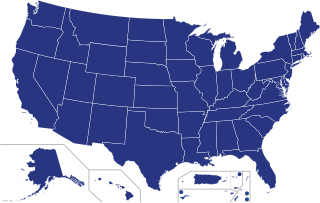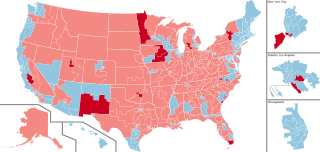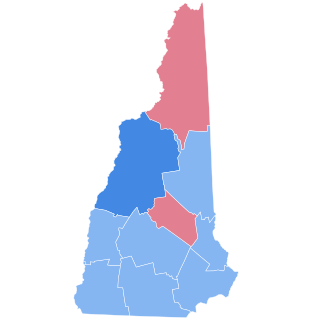The 2004 Libertarian National Convention was held from May 28 to May 31, 2004, at the Marriott Marquis Hotel in Atlanta, Georgia. The delegates at the convention, on behalf of the U.S. Libertarian Party, nominated Michael Badnarik for president and Richard Campagna for vice president in the 2004 presidential election. The convention was televised nationally on C-SPAN.
This article contains the results of the 2008 Republican presidential primaries and caucuses.
The Libertarian Party of the United States was formed in Colorado Springs in the home of Luke Zell by a group of individuals led by David Nolan on December 11, 1971, after several months of debate among members of the Committee to Form a Libertarian Party, founded July 17. The formation was prompted in part by price controls and the end of the Gold Standard implemented by President Richard Nixon. The Libertarian Party viewed the dominant Republican and Democratic parties as having diverged from what they viewed as the libertarian principles of the American Founding Fathers. This group included John Hospers, Edward Crane, Manuel Klausner, Murray Rothbard, Roy Childs, D. Frank Robinson, and Theodora (Tonie) Nathan.

From January 3 to June 5, 2012, voters of the Democratic Party chose its nominee for president in the 2012 United States presidential election. President Barack Obama won the Democratic Party nomination by securing more than the required 2,383 delegates on April 3, 2012, after a series of primary elections and caucuses. He was formally nominated by the 2012 Democratic National Convention on September 5, 2012, in Charlotte, North Carolina.
The following is a timeline of major events leading up to, during, and after the 2016 United States presidential election. The election was the 58th quadrennial United States presidential election, held on November 8, 2016. The presidential primaries and caucuses were held between February 1 and June 14, 2016, staggered among the 50 states, Washington, D.C., and U.S. territories. The U.S. Congress certified the electoral result on January 6, 2017, and the new president and vice president were inaugurated on January 20, 2017.

The 2016 Libertarian Party presidential primaries and caucuses allowed electors to indicate non-binding preferences for the Libertarian Party's presidential candidate. These differed from the Republican or Democratic presidential primaries and caucuses in that they did not appoint delegates to represent a candidate at the party's convention to select the party's nominee for the United States presidential election. The party's nominee for the 2016 presidential election was chosen directly by registered delegates at the 2016 Libertarian National Convention, which ran from May 26 to 30, 2016. The delegates nominated former New Mexico governor Gary Johnson for president and former Massachusetts governor Bill Weld for vice president.

The 2016 United States presidential election in Virginia was held on November 8, 2016, as part of the 2016 general election in which all 50 states plus the District of Columbia participated. Virginia voters chose electors to represent them in the Electoral College via a popular vote pitting the Republican nominee, businessman Donald Trump, and running mate Indiana Governor Mike Pence against Democratic nominee, former Secretary of State Hillary Clinton and her running mate, Virginia Senator Tim Kaine.

The 2016 United States presidential election in California was held on Tuesday, November 8, 2016, as part of the 2016 United States presidential election in which all 50 states plus the District of Columbia participated. California voters chose electors to represent them in the Electoral College via a popular vote, pitting the Republican Party's nominee, businessman Donald Trump, and running mate Indiana Governor Mike Pence against Democratic Party nominee, former Secretary of State Hillary Clinton, and her running mate Virginia Senator Tim Kaine. California had 55 electoral votes in the Electoral College, the most of any state.

The 2016 Constitution Party presidential primaries were 2 electoral contests, held in the states of Idaho and Missouri, by the Constitution Party during the 2016 election season in order to allocate delegates from those states to the 2016 Constitution Party National Convention.

Presidential primaries and caucuses of the Republican Party took place in many U.S. states, the District of Columbia, and five U.S. territories from February 3 to August 11, 2020, to elect most of the 2,550 delegates to send to the Republican National Convention. Delegates to the national convention in other states were elected by the respective state party organizations. The delegates to the national convention voted on the first ballot to select Donald Trump as the Republican Party's nominee for president of the United States in the 2020 election, and selected Mike Pence as the vice-presidential nominee.

The 2020 United States House of Representatives elections were held on November 3, 2020, to elect representatives from all 435 congressional districts across each of the 50 U.S. states to the 117th United States Congress, as well as six non-voting delegates from the District of Columbia and the inhabited U.S. territories. Special House elections were also held on various dates throughout 2020.

The 2020 Libertarian Party presidential primaries and caucuses were a series of electoral contests to indicate non-binding preferences for the Libertarian Party's presidential candidate in the 2020 United States presidential election. These differed from the Republican or Democratic presidential primaries and caucuses in that they do not appoint delegates to represent a candidate at the party's convention to select the party's presidential nominee.

The 2020 Green Party presidential primaries were a series of primary elections, caucuses and state conventions in which voters elected delegates to represent a candidate for the Green Party's nominee for President of the United States at the 2020 Green National Convention. The primaries, were held in numerous U.S. states on various dates from early spring into early summer of 2020, and featured elections publicly funded, concurrent with the Democratic Party and Republican Party primaries, and elections privately funded by the Green Party, held non-concurrently with the major party primaries.

The 2020 United States presidential election in California was held on Tuesday, November 3, 2020, as part of the 2020 United States presidential election in which all 50 states plus the District of Columbia participated. California voters chose electors to represent them in the Electoral College via a popular vote, pitting the Republican Party's nominee, incumbent President Donald Trump, and running mate Vice President Mike Pence against Democratic Party nominee, former Vice President Joe Biden, and his running mate Kamala Harris, the junior senator from California. In the 2020 election, California had 55 electoral votes in the Electoral College, the most of any state. Biden won by a wide margin, as was expected; however, California was one of six states where Trump received a larger percentage of the two-party vote than he did in 2016. This election also marked the first time since 2004 that the Republican candidate won more than one million votes in Los Angeles County due to increased turnout.

The 2020 United States presidential election in New Hampshire was held on Tuesday, November 3, 2020, as part of the 2020 United States presidential election in which all 50 states and the District of Columbia participated. New Hampshire voters chose electors to represent them in the Electoral College via a popular vote, pitting the Republican Party's nominees, incumbent President Donald Trump and Vice President Mike Pence, against the Democratic Party's nominees, former Vice President Joe Biden and his running mate, Senator Kamala Harris. New Hampshire has four electoral votes in the Electoral College.

Below is a detailed tally of the results of the 2020 Republican Party presidential primary elections in the United States. In most U.S. states outside New Hampshire, votes for write-in candidates remain untallied.

The 2012 Libertarian Party presidential primaries allowed voters to indicate non-binding preferences for the Libertarian Party's presidential candidate. These differed from the Republican or Democratic presidential primaries and caucuses in that they did not appoint delegates to represent a candidate at the party's convention to select the party's nominee for the United States presidential election. The party's nominee for the 2012 presidential election was chosen directly by registered delegates at the 2012 Libertarian National Convention, which ran from May 2 to 6, 2012. The delegates nominated former New Mexico Governor Gary Johnson for President and former judge Jim Gray for Vice President.

The 2008 Libertarian Party presidential primaries allowed voters to indicate non-binding preferences for the Libertarian Party's presidential candidate. These differed from the Republican or Democratic presidential primaries and caucuses in that they did not appoint delegates to represent a candidate at the party's convention to select the party's nominee for the United States presidential election. The party's nominee for the 2008 presidential election was chosen directly by registered delegates at the 2008 Libertarian National Convention, which ran from May 22 to 26, 2008. The delegates nominated former congressman Bob Barr for president and media personality Wayne Allyn Root for vice president.
In the 2024 United States presidential election, different laws and procedures govern whether or not a candidate or political party is entitled to appear on voters' ballots. Under Article 2, Section 1 of the United States Constitution, laws about election procedure are established and enforced by the states. Additionally, there are often different requirements for primary and general elections, and requirements for primary elections may additionally differ by party.


















